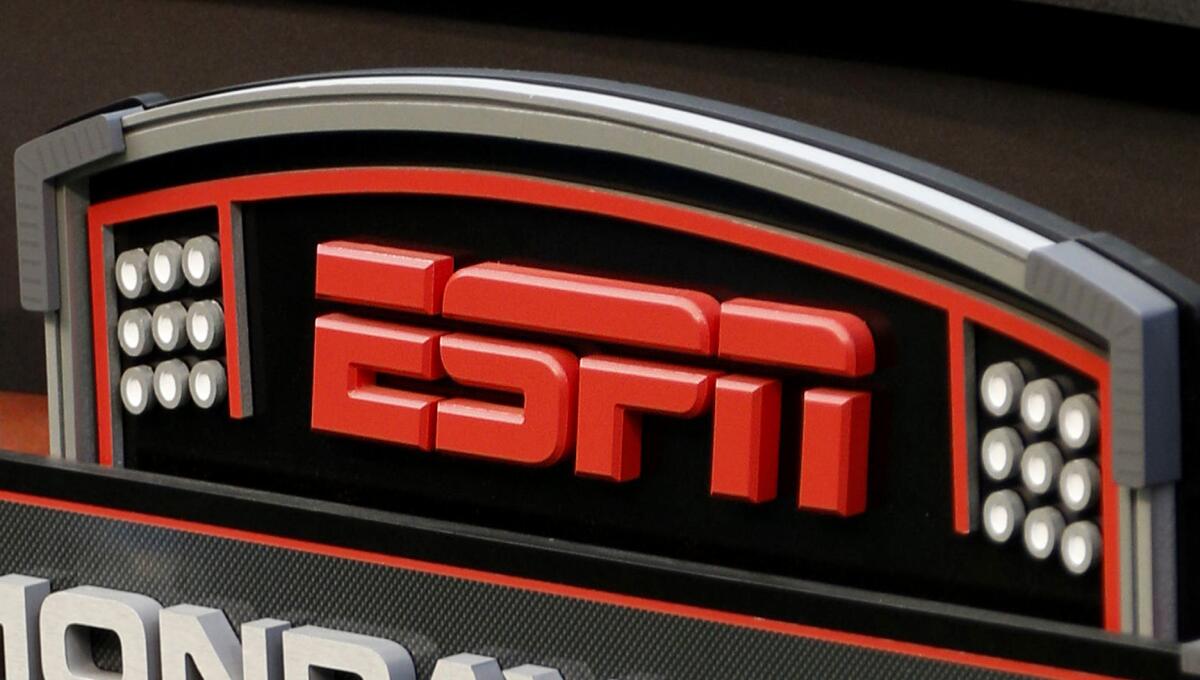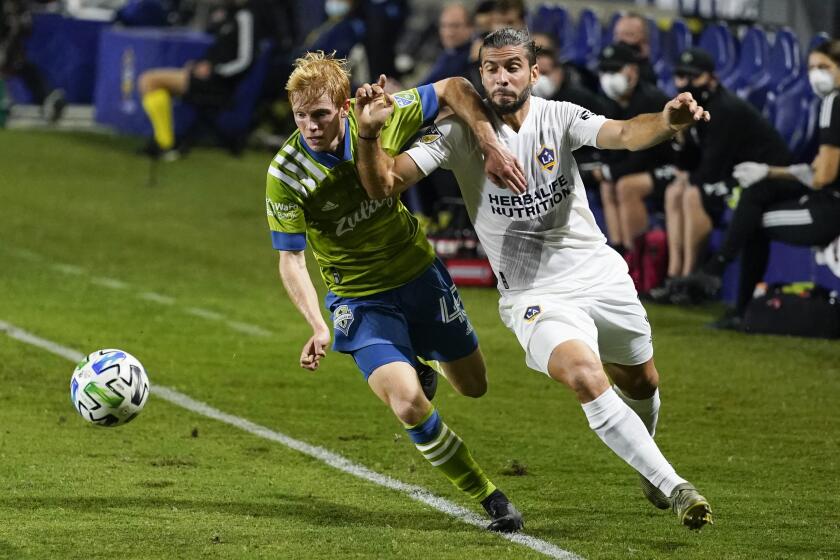Disney’s Bob Iger says ESPN is not for sale. Now the pressure is on

- Share via
Walt Disney Co. Chief Executive Bob Iger this week announced a “major transformation” for the entertainment media giant, raising a familiar question from Wall Street: What will happen to ESPN?
Iger was clear that, despite clamoring from some investors, he has no plans to get rid of ESPN, the best-known sports media brand in the business, either by selling it or through a spinoff.
But leading ESPN into the future won’t be easy, as the company still must navigate the pressures of continued cord-cutting and escalating fees for the rights to air live sports.
It also will face greater accountability. For the first time, it will start reporting financial results as a free-standing unit under its chairman Jimmy Pitaro. ESPN’s results have previously been disclosed as part of Disney’s larger television networks segment, eluding deep, detailed scrutiny.
The new status for ESPN follows Iger’s announcement that he is targeting $5.5 billion in cost savings, largely from its content and marketing divisions. Disney said it plans to achieve $3 billion in content savings, excluding sports, over the next few years.
Iger told CNBC on Thursday that ESPN will remain a part of the company “as long as it continues to be profitable and it too needs to find a path that basically enables it to continue to deliver the kind of results that we’d like it to deliver.” On Wednesday’s call with analysts, he swatted away speculation of an ESPN sale, though he said such options had been reviewed in his absence.
Tech giant nabs the rights to the out-of-market Sunday games that had been offered to DirecTV customers since 1994.
ESPN’s exposure to consumers shifting away from traditional TV to streaming, as well as escalating sports rights fees, led several investors and analysts to suggest Disney should spin off the unit with some debt attached. Activist billionaire investor Dan Loeb, of Third Point Capital, was among the voices calling for an ESPN spinoff to help reduce Disney’s debt load, but he eventually backed off.
Such a concept seemed stunning considering ESPN’s stature in the media industry.
Back in 1995 when Disney merged with Capital Cities/ABC, ESPN was considered the crown jewel in the acquisition, as it was the first stop in sports news and highlights and the locomotive for a still-expanding cable business. Over time the network added more must-have TV sports properties, peaking in 2006 when it took over “NFL Monday Night Football” from ABC, the network that launched the franchise in 1970.
ESPN’s importance in the cable bundle has long been reflected in the high fees it is able to command from pay TV providers. But with every consumer who cuts the cord, that revenue shrinks.
While those TV subscription dollars have diminished, ESPN has faced pressure on the cost side. The rights fee for “NFL Monday Night Football” — already the priciest among the league’s packages — increased by around 30% in the most recent deal with the league.
The challenge is only expected to intensify as deep-pocketed tech giants such as Amazon, Apple and Google are moving into sports to bolster their streaming businesses.
Amazon established itself as a worthy NFL partner with “Thursday Night Football.” Apple has an exclusive Friday night package of Major League Baseball games and every regular-season Major League Soccer game. Google’s YouTube is the new home of the NFL’s Sunday Ticket package that gives subscribers games from outside of their home markets.
Iger has a special affinity for ESPN, having come up through ABC Sports, which was eventually absorbed into the division. But he has long been clear-eyed about the realities facing the future of the traditional television business.
When Iger was a top executive at ABC in the early 1990s, he was candid that the decline of the broadcast networks was inevitable as emerging cable channels chipped away at their share of the audience. As the Disney chief who struck the first deal with Apple to distribute shows digitally, Iger was early to understand the impact streaming has had on the traditional media ecosystem.
Years ago, Iger cited cord-cutting and its impact on ESPN in an earnings call, which triggered a stock selloff. In 2018, ESPN launched its own streaming service.
Iger’s belief did not change after he left Disney. As citizen Iger, he told an industry conference in September that traditional TV “is marching to a distinct precipice, and it’s going to be pushed off.”
Analysts are hoping that Iger’s pragmatic perspective will guide Disney’s handling of ESPN.
“We urge Disney to embrace that realistic view and tactfully manage their investments in future sports rights, staffing and overheads to reflect that bearishness,” analyst Michael Nathanson wrote.
A report from Morgan Stanley analyst Benjamin Swinburne said that Disney’s decision to report ESPN’s individual financial performance indicates that Iger and Pitaro are confident that ESPN’s power extends beyond the traditional TV business.
ESPN executives have long believed the linear channel could succeed as a direct-to-consumer streaming offering — the unit already has 25 million consumers paying for the ESPN+ service — if cable can no longer provide the critical mass it needs to succeed. Pitaro also now controls ESPN+, which was previously under a controversial division that oversaw all distribution and streaming operations. ESPN reached 108 million consumers each month through its digital properties and social media, many of them younger people who are not watching traditional TV.
Tech giants are making their move on media sports rights. What does that mean for the last sure bet for TV networks?
“By showing ESPN as a stand-alone business — inclusive of all its digital assets including ESPN+ — Disney is likely of the view that the financial future of this business is brighter than the market assumes today,” Swinburne said.
ESPN has already displayed restraint in its sports rights negotiations. The company walked away from making a new deal with Major League Soccer, which is now behind the paywall of Apple TV+.
ESPN will be tested when it goes into rights renewal discussions with the NBA (its current deal is up after the 2024-25 season). Amazon and other tech companies are expected to compete vigorously for the package.
But ESPN has a firm grasp on its expenses going forward, as many of the rights deals for major sports are locked up for well into the decade, including the NFL, Major League Baseball, the NHL and college football.
If a company is in the traditional TV business, live sports events remain the strongest driver of big audiences that advertisers want to reach. While the rest of linear television continued to face a slow decline last year, ESPN’s ratings grew 8% overall and 14% in prime time.
More to Read
Inside the business of entertainment
The Wide Shot brings you news, analysis and insights on everything from streaming wars to production — and what it all means for the future.
You may occasionally receive promotional content from the Los Angeles Times.













